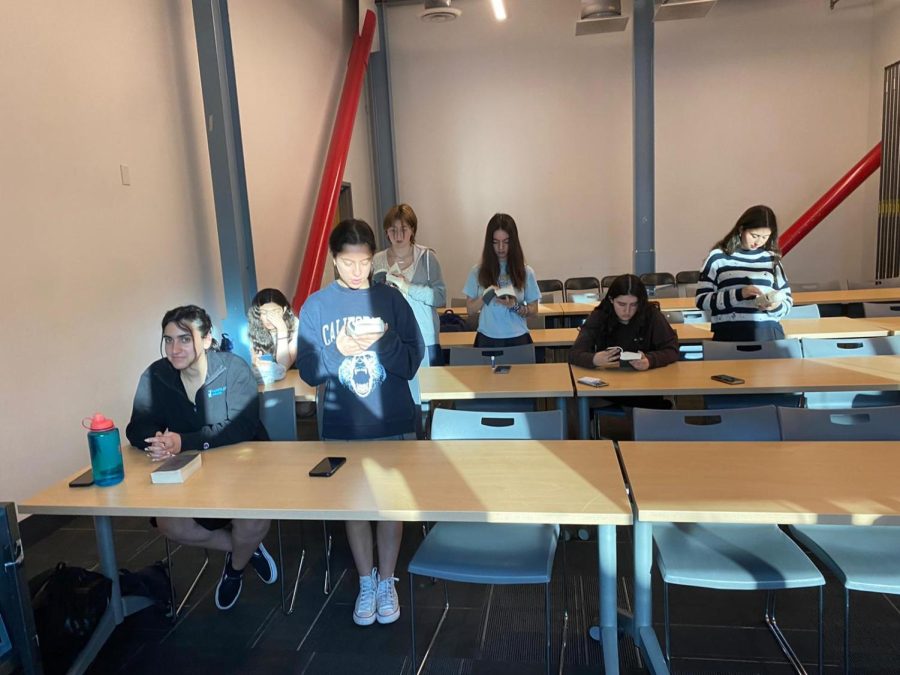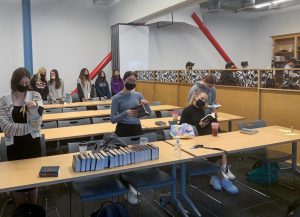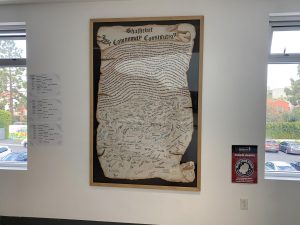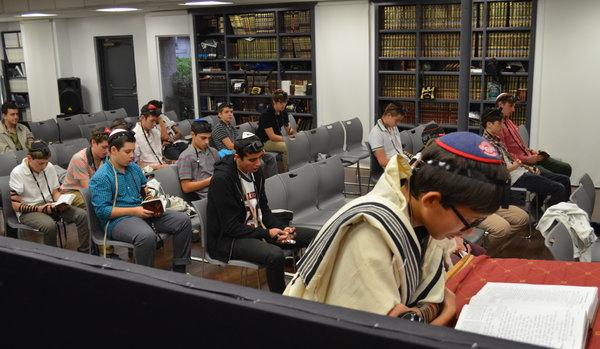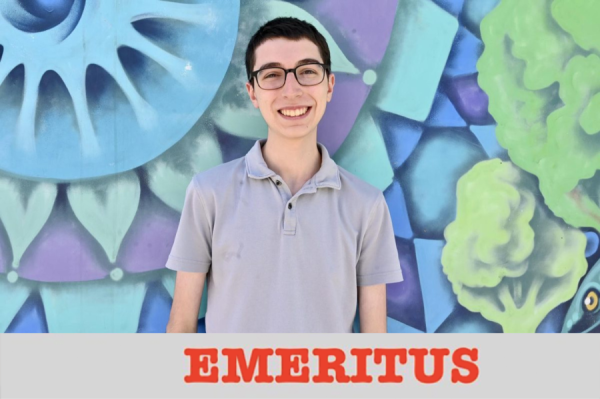No proposals yet from students to fix Hashkama
Officials say they’re still open to suggestions that would ensure full attendance without requiring more faculty supervision
EARLY: Hashkama Minyan met before start of school April 2. Students enrolled in advanced Judaic studies classes that meet during breakfast are allowed to go to prayer before school starts, whereas in past years anyone could pray early. Attendance is much lower.
May 16, 2022
Two months after Head of School Rabbi David Block asked students for proposals to expand access to Hashkama Minyan while also ensuring good davening attendance overall, no new proposal has been made, school officials said this week.
Rabbi Block, who made the request at Town Hall Feb. 18, said that day that he understood students’ frustration when administration suddenly restricted the popular early-morning service to advanced Gemara students, after it previously had been open to whoever wanted to come.
He said he was open to suggestions of how to reopen it to all, as long as they included a way for faculty to know who attended which minyan.
“I wish they would” make suggestions, Rabbi Block said in an interview April 1. “I think it’s a great thing. I’m very open to having our crew, our students and the faculty, vote on changing the Haskama rule. It just needs to account for the different things, and I don’t think anyone has yet.”
Schoolwide Hashkama meant students could pray before school started and then take a free period during schoolwide davening after first. It was student-led and did not have formal faculty supervision, meaning students took attendance and missed most of davening themselves.
In 2019, scanning devices were introduced; students had to scan in so faculty would know where they davened that day and that they had. But students could scan others’ chips and make it seem as if they went to davening, giving them a free period without being caught.
Since there have been no new proposals after more than two months, Dean of Students Rabbi Ari Schwarzberg believes “it’s actually not such a big deal, and people are fine with the way things are,” he said.
“I haven’t heard anyone complain about the Hashkama issue or say anything about it in months,” said Rabbi Schwarzberg, “and when Rabbi Block spoke about it … and offered people to come up with solutions, nobody has given any.”
Throughout the year, Hashakama has been open to honors Gemara students in 12th grade every day, 11th and 10th grades on Mondays, Wednesdays and Fridays, and ninth grade on Tuesdays and Thursdays.
A tweak was made March 22, and students not in advanced classes are permitted to attend Hashkama if they receive special permission in advance.
Students’ attitudes seem partly related to what grade they are in. Upperclassmen remember participating in open Hashkama before Covid. For sophomores, all-school davening in tents on the roof last year was one of their first in-person experiences of high school. When this year’s freshmen arrived, the new policy was already in place.
Junior Oz Shalom said reopening the minyan for everyone could make Shalhevet feel more like it was before.
“This next year should be the year of Covid’s over and we’re back to somewhat normal life,” said Oz.
Dr. Sheila Keiter, a history and Judaic Studies teacher who attends the Ashkenaz minyan, understands logistically why the policy was changed this year, but said ideally it should be opened up.
“It cuts off choice, right?” Dr. Keiter said. “I feel bad for the person who legitimately wants to daven seriously in an earlier minyan regardless of AGS.”
Freshman Leah Cohen said she doesn’t “fully understand why they stopped it.”
“I mean, I get the attendance issue, but there’s an attendance issue with the regular minyan,” Leah said.
Senior Caleb Fishman thinks the only way to solve the problem is for people who care about going to Hashkama apply.
“I think that people just needed to get used to it,” said Caleb. “I think we’re at a point now where everybody’s kind of reached a really good balance, and especially as we’re starting to open up Hashkama, we’ve kind of reached a point where it’s very clear that this system is starting to work a little bit.”
The February Town Hall discussion was prompted by a proposal from the Boiling Point Editorial Board, which proposed Dec. 21 that students be able to vote on whether the minyan should be completely reopened. The proposal was shot down by the Judicial Review Subcommittee, which said it was ineligible for a vote because it pertained to curriculum, which is exempt from school democracy.
And while no students have brought proposals through Just Community action, some do have ideas.
Oz Shalom said having faculty members or students take attendance would solve the attendance issue.
“If I’m right, there are usually faculty members at the school early,” Oz said in an interview April 26. “I would ask them to take attendance, or a student who actually takes davening seriously who would be able to take attendance and be true to himself or herself and to the school about what time they came.”
Oz has not proposed this to administration but said he might, especially if a committee was formed.
But Rabbi Schwarzberg said a new policy should not have to include more policing by faculty.
“Policies that require more enforcement and policing are bad policies,” Rabbi Schwarzberg said. “So we need to find a way when something is created initially to ensure that it’s systematically sound, and that’s what’s important on our end.”
Freshman Samuel Kerendian thought a good solution would be to have an application process.
“It’s really easy to tell whether a student just wants to go there for an extra free period or if they want to take davening seriously, or why they need that free period,” Samuel said April 1.
“Because if you take out all the kids that just want to go there so they can talk, creating an application where you just talk with Rabbi Schwarzberg and he says yes or no [would keep it] exclusive but still allow more students to come, and more devoted to davening.”
That would be similar to the revised Hashkama policy that’s been in place since March, which Caleb Fishman thinks has been working well.
“When you have people who are stepping forward and committing,” said Caleb, “they’re saying that we’re going there not just to talk but actually to daven, to participate, and contribute to this type of community. That’s the type of people that need to be there.”
Oz said he enjoyed the way the system was set up prior to Covid.
“When I was a freshman, I used to go to Hashkama a lot and I was able to connect more through Hashkama,” Oz said, “because it was a davening more centered towards serious davening, and with that I was also able to do more work during the free period or just like take a break.”
Sophomore Gabby Judaken, who is not in the AGS class, said if she could, she would go to Hashkama “a good amount of days.”
“Both my parents work, sometimes it’s a difficult schedule, and sometimes going to school earlier is just the better option and it hasn’t really been given this year,” Gabby said.
The school year only has about one month left so it’s unlikely there will be change before fall.
But Rabbi Block said it’s not too late for students to think about the issue and make suggestions.
“I think oftentimes when we throw it to students in that way, when you say ‘hey it’s not as simple as saying do this or don’t do that,’ then they realize the complexity and realize, you know, maybe it’s not warming up with my efforts,” Rabbi Block said, though he called that “speculation.”
“I have no idea, it could be that that’s not true,” he said.
He also said the administration would revisit the topic for next year, and that he’d listen to student input – or lack of it.
“In the summer whenever we’re reviewing policies, we always review things, regardless of whether students bring it up or not, to see whether it’s still effective,” Rabbi Block said. “So we would still – there’s still a possibility that change could happen.
“But I will say that when the impact is supposed to be helpful to students and we don’t hear from the students, that also plays a role.”

